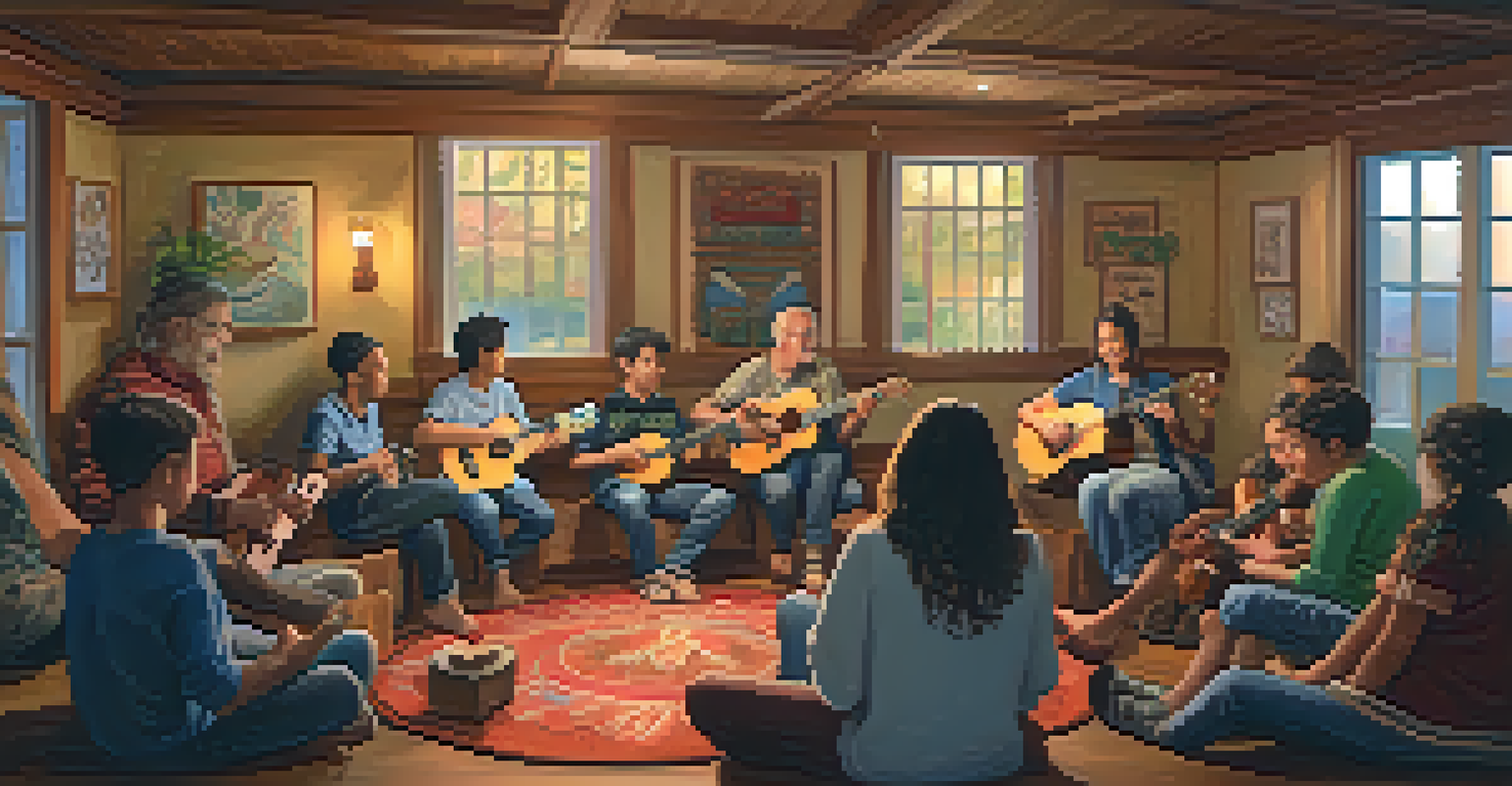The Impact of Ukulele Music on Cultural Exchange in Communities

Introduction to Ukulele Music and Cultural Exchange
The ukulele, a small and charming string instrument, has a unique ability to bring people together. Its roots trace back to Hawaii, but its influence has spread globally, creating a beautiful tapestry of musical styles. This article will explore how ukulele music acts as a bridge in cultural exchange, promoting understanding and connection among diverse communities.
Music is the universal language of mankind.
Cultural exchange refers to the sharing of ideas, traditions, and practices between different groups. When it comes to music, instruments like the ukulele play a pivotal role in this process. Through strumming simple chords and catchy melodies, individuals can communicate emotions and stories that transcend language barriers.
As we delve into the impact of ukulele music, we’ll discover how it fosters community engagement, encourages creativity, and strengthens bonds among people from various backgrounds.
The Ukulele's Global Journey and Its Influence
Initially popularized in Hawaii, the ukulele has journeyed across continents, adapting to various cultural influences along the way. From the traditional Hawaiian sounds to contemporary pop and folk, the ukulele has found its place in many genres. This adaptability is a key factor in its role as a tool for cultural exchange.

For example, in places like Japan, the ukulele has been embraced in local music scenes, leading to unique blends of Hawaiian and Japanese musical styles. Such collaborations not only showcase the versatility of the instrument but also highlight the beauty of cultural fusion. It exemplifies how music can evolve while respecting its origins.
Ukulele as a Cultural Bridge
The ukulele fosters cultural exchange by connecting diverse communities through music and shared experiences.
This global journey of the ukulele reflects a broader trend in cultural exchange where music serves as a universal language, connecting people and fostering mutual appreciation.
Building Community Through Ukulele Groups
Ukulele clubs and groups have sprung up in communities around the world, creating spaces for people to gather and share their love for music. These groups often welcome individuals of all ages and skill levels, promoting inclusivity and collaboration. Participants not only learn to play the instrument but also engage in cultural discussions and exchanges.
The beautiful thing about learning is that no one can take it away from you.
For instance, many ukulele groups host workshops that introduce participants to various musical styles from different cultures. This hands-on experience not only enhances musical skills but also broadens cultural horizons. It’s a lively way to learn about traditions, rhythms, and songs that might otherwise remain unfamiliar.
Through these community gatherings, friendships blossom, and cultural appreciation deepens, demonstrating the powerful impact of music in fostering human connections.
Ukulele Music in Cultural Festivals and Events
Cultural festivals are another vibrant platform where ukulele music shines, bringing together diverse communities to celebrate their heritage. These events often feature ukulele performances, workshops, and jam sessions that encourage participation and interaction. Such gatherings showcase the instrument's ability to unite people through shared joy and creativity.
For instance, festivals like the Hawaii Ukulele Festival attract musicians and enthusiasts from around the world, celebrating not only Hawaiian culture but also the global love for the ukulele. Attendees can experience a rich mix of performances, from traditional Hawaiian songs to contemporary covers, reflecting the instrument's versatility.
Community Engagement through Music
Ukulele groups and festivals promote inclusivity and collaboration, enhancing friendships and cultural appreciation.
These festivals are more than just musical showcases; they are celebrations of cultural diversity and exchange, where stories and traditions are shared, creating lasting memories.
Educational Initiatives and Ukulele Music
Educational programs incorporating the ukulele have gained popularity in schools and community centers. These initiatives often emphasize music as a tool for learning and cultural exchange, making it accessible to students from various backgrounds. By introducing the ukulele in classrooms, educators can foster creativity and teamwork among students.
For instance, programs might include lessons on folk music from around the world, encouraging students to explore different cultures through song. This not only enhances musical skills but also instills a sense of respect and appreciation for diversity among young learners. It's an engaging way to promote cultural literacy.
As students collaborate on ukulele projects, they learn to appreciate each other's backgrounds while creating something beautiful together—music that resonates beyond borders.
The Role of Technology in Ukulele Music Exchange
In our digital age, technology has significantly impacted how ukulele music fosters cultural exchange. Online platforms allow musicians from different parts of the world to connect, collaborate, and share their music. This accessibility has led to a surge of interest in ukulele tutorials, performances, and cultural exchanges online.
Social media, for example, has become a powerful tool for ukulele enthusiasts to showcase their talent and learn from one another. Musicians can share their unique interpretations of songs from various cultures, leading to a richer understanding of global musical heritage. This virtual community creates a space where cultural boundaries fade and creativity flourishes.
Technology Enhancing Connections
Digital platforms allow ukulele enthusiasts to collaborate globally, enriching cultural understanding and creativity.
Through technology, the spirit of cultural exchange continues to thrive, as individuals connect over shared interests, transcending geographical limitations.
Personal Stories: Ukulele Music and Cultural Connection
Personal anecdotes often illustrate the profound impact of ukulele music on cultural exchange. Many musicians share stories of how playing the ukulele has allowed them to connect with others, bridging gaps that might have seemed insurmountable. For instance, a traveler might recount how strumming a few chords in a foreign country led to friendships and memorable experiences.
These stories highlight the instrument's ability to evoke emotions and create shared moments. Whether it's a family gathering, a community event, or a chance encounter, the ukulele serves as a catalyst for connection and understanding. It reminds us that music is a universal language that can break down barriers.

Ultimately, these personal experiences underscore the ukulele's role in fostering cultural exchange, revealing how a simple instrument can create lasting bonds among diverse individuals.
Conclusion: The Ongoing Impact of Ukulele Music
As we reflect on the impact of ukulele music on cultural exchange, it's clear that this little instrument carries immense significance. From community gatherings to global festivals, the ukulele continues to unite people, fostering an appreciation for diverse cultures. Its ability to adapt and resonate with various musical styles is a testament to its role in promoting cultural understanding.
Moreover, as technology advances, the opportunities for cultural exchange through ukulele music will only expand. Online platforms and educational initiatives will continue to connect people, encouraging collaboration and learning across borders. It's an exciting time for ukulele enthusiasts and cultural explorers alike.
In essence, the ukulele serves as more than just an instrument; it is a symbol of unity, creativity, and the beautiful exchange of cultures that enrich our communities.